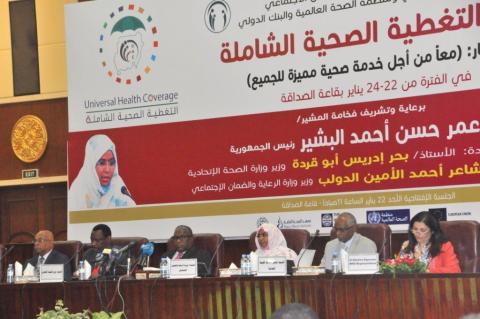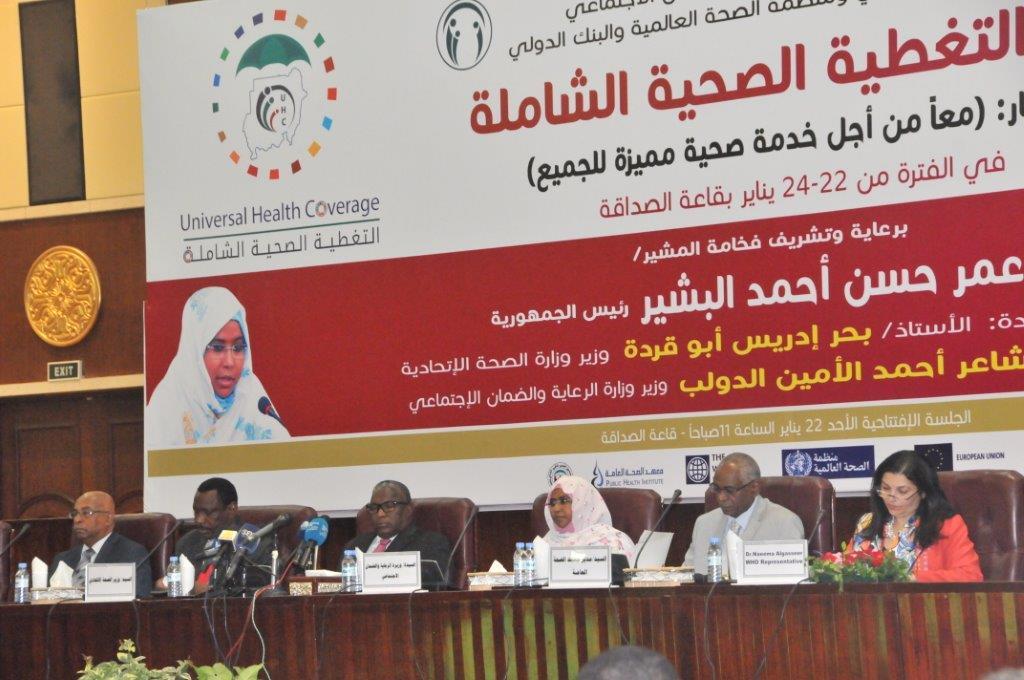
Since the recent launch of the new Sustainable Development Goals (SDGs), everyone is talking about the need to adopt an integrated, cross-sector approach to SDGs implementation – but to date only a very few have translated this aim into concrete action.
Sudan’s leadership is among the few to have done so – even ahead of the adoption of the SDG agenda. In 2013, the Federal Ministry of Health of Sudan (FMOH) adopted a policy dialogue initiative, led by the Public Health Institute with support from the EU-Luxembourg-WHO Universal Health Coverage Partnership (UHC-P), which, according to his Excellency Dr Bahar Idris Abugarda, Federal Minister of Health, “is one of the FMOH’s most important initiatives in recent years, as it has brought together stakeholders from different sectors and backgrounds, including development partners and civil society, to discuss several vital health projects and policies in five key sectors”.
On the sidelines of the UHC-P’s 4th Annual Technical Meeting in Barcelona in March 2016, Community Systems Foundation (CSF) spoke to representatives from the Ministry of Health and Public Health Institute in Sudan to find out more about this innovative initiative.
Dr Abdalla Sid Ahmed director of the Public Health Institute/FMOH of Sudan explained that the initiative was the result of a 2008-2011 health financing review, conducted by his institute with support from the UHC-P. The review used WHO’s OASIS (Organizational Assessment for Improving and Strengthening Health Financing) tool – an analytical approach that can be applied in a flexible way to systematically analyse the strengths and weaknesses of a health financing system and to identify suggestions for improving its performance in order to move towards UHC. Key recommendations were formulated for each of the main functions of health financing – revenue collection, pooling and purchasing, and stewardship – and findings focused on (i) unifying policy-making at both the technical and political level; (ii) expanding fiscal space through efficiency, external funds and its direction to health protection; (iii) merging financing sources gradually to decrease fragmentation; and (iv) adopting strategic provider purchasing approaches to improve the efficiency and quality of services.
According to Dr Sid Ahmed, the assessment lays the groundwork for addressing bottlenecks identified in the review by elaborating the key policy options for FMOH policy dialogue across five areas of focus: Health financing, Health in All Policies (HiAP), family health, global health strategy and health policy systems.
The first step to identifying policy options in each focus area, according to Dr Sid Ahmed, was to ensure that, whatever the results of the policy discussions, they would be followed up on by all relevant line ministries and sectors. To that end, a new body – the National Health Coordinating Council – was entrusted to take the policy dialogue initiative forward. Chaired by Sudan’s President and co-chaired by the Vice President, the council unites all relevant ministries and sectors in an inclusive and participatory process in order to develop and adopt health policies across the five focus areas, and coordinate implementation and monitoring. “The fact that this body is accountable to the President makes it a strong mechanism for enforcing HiAP”, said Sid Ahmed.
To support dialogue in the area of HiAP, a workshop was organised in Khartoum in August 2015, where 80 senior-level representatives from different ministries and sectors discussed policy options and objectives for disease prevention and health promotion. The engagement resulted in a roadmap for implementing HiAP by: (i) building accountability and strengthening the commitment of the National Health Coordination Council and Parliament; (ii) strengthening structures for HiAP; (iii) developing mechanisms for better governance and increased transparency; and (iv) building capacity for effective implementation, better planning and evaluation. For each of these objectives, a set of concrete implementation measures was agreed, with specific milestones to be introduced once each is costed and operationalized.
According to El Fatih Mohamed Malik, Director General of the Planning and International Health Directorate of the FMOH, the policy dialogue process raised awareness among the different stakeholders about the need to put health at the forefront of their own policies and actions.
El Fatih also described the process for developing the global health strategy: “With support from the UHC-P, an initial workshop was organized in April 2013, bringing together different ministries – including the Ministries of Health; Social Welfare, Women and Child Affairs; Internal Affairs; and Foreign Affairs – to discuss Sudan’s key national and international health issues”.
On the basis of the key priority issues identified, tailored workshops were then organized on topics such as health and trade, health and environment, health security and health workforce. Following consultation with relevant ministries and sectors, the conclusions drawn from these workshops were summarized to feed into Sudan’s Global Health Strategy 2015-2019 – which specifies the interaction required between health and other sectors and is considered a complementary reference document for the formulation of national health sector policies.
Priority action areas included in the Global Health Strategy 2015-2019 include, among others: (i) reviewing national strategies and legislation to incorporate TRIPS-related flexibilities (trade and health); (ii) developing a comprehensive approach to a multi-sectorial HRH information and planning system (HRH); (iii) taking the necessary measures to ensure systematic surveillance, response and reporting to WHO in line with Sudan’s IHR obligations (health security); and (iv) working towards a green economy that integrates a whole-of-government and HiAP approach (health and environment). A steering committee was established to take implementation forward.
In the area of health systems policy, Dr Sid Ahmed explained that some issues emerged during the review of national health policies, for example: how will policies be formulated, implemented and monitored? From there, specific action areas were identified, including strengthening the National Health Coordination Council, developing a policy council and forum, and improving coordination between federal- and state-level authorities. WHO supported the policy dialogue process by bringing in renowned international experts.
With regard to family health policy, an initial assessment made with UHC-P support uncovered that family health care services had, in the past, been hindered by a very limited budget, that there was insufficient continuity of care, and that it was overly focused on training senior managers. On that basis, the FMOH decided that a more comprehensive approach to family health was needed, as was WHO technical assistance to examine emerging policy options in the area of family health. One such option under consideration is the re-design of government structures in order to support the family health medical practice as a team and to direct national health insurance fees to those teams rather than to individual physicians.
According to Dr Abdalla Sid Ahmed and Dr El Fatih Mohamed Malik, while ensuring these new policy frameworks are adequately implemented and monitored will be challenging, the UHC-P is helping to drive important health system reforms, and the essential foundations for ensuring “health in all policies and health policies for all” have been laid in Sudan.
